Poirot: Series 6 Blu-ray Movie
HomePoirot: Series 6 Blu-ray Movie 
Acorn Media | 1995-1996 | 428 min | Not rated | Aug 28, 2012
Movie rating
8.3 | / 10 |
Blu-ray rating
| Users | 0.0 | |
| Reviewer | 4.0 | |
| Overall | 4.0 |
Overview
Poirot: Series 6 (1995-1996)
The sixth series of the TV dramatization of the cases of Agatha Christie's brilliant Belgian detective first aired in Jan.-Feb. 1995 and Feb.-Mar. 1996. These feature-length mysteries include: <i>Hercule Poirot's Christmas, Hickory Dickory Dock, Murder on the Links</i> and <i>Dumb Witness</i>.
Starring: David Suchet, Hugh Fraser (I), Philip Jackson (II), Pauline Moran, David YellandDirector: Edward Bennett (I), Andrew Grieve, Renny Rye, Brian Farnham
| Period | Uncertain |
| Mystery | Uncertain |
| Crime | Uncertain |
| Drama | Uncertain |
| Thriller | Uncertain |
Specifications
Video
Video codec: MPEG-4 AVC
Video resolution: 1080p
Aspect ratio: 1.33:1
Original aspect ratio: 1.78:1, 1.33:1
Audio
English: Dolby Digital 2.0 (256 kbps)
Subtitles
English SDH
Discs
50GB Blu-ray Disc
Two-disc set (2 BDs)
Packaging
Slipcover in original pressing
Playback
Region A (locked)
Review
Rating summary
| Movie | 4.5 | |
| Video | 4.0 | |
| Audio | 3.0 | |
| Extras | 0.0 | |
| Overall | 4.0 |
Poirot: Series 6 Blu-ray Movie Review
Millennium Approaches
Reviewed by Michael Reuben August 23, 2012Series 6 of Poirot was spread over two years, with initial airings in January and February 1995, then in February and March 1996. It would be nearly four years before the show returned in January 2000 with The Murder of Roger Ackroyd, and by then the familiar format had already begun to undergo a metamorphosis. The four full-length installments of Series 6 are the last of the "classic" entries in the Poirot canon. It should come as no surprise that these are among the most byzantine of the episodes of the series to date, as the creators continued to experiment with dramatic form and actor David Suchet continued his exploration of every nuance of Agatha Christie's most famous detective. There are moments in these stories where the solution of the mystery seems almost an afterthought, and the machinery of muddying the waters, both intellectually and cinematically, appears to be the primary concern. Of course, this simply encourages repeat viewings, because the episodes are soundly plotted underneath. Indeed, in a few instances (Dumb Witness being a notable example), the screenwriters have made minor adjustments in the plot to overcome objections raised by critics when the books were first published. Several of the episodes in this series reflect a departure in visual style and/or quality from previous sets of Poirot. This is discussed in more detail in the "Video" section.
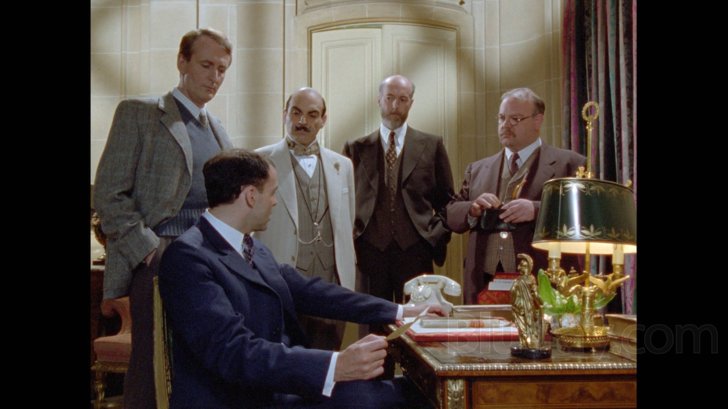
Hercule Poirot's Christmas Poirot bids farewell to a doleful Chief Inspector Japp (Philip Jackson), who is off to spend Christmas with his in-laws in Wales. Poirot himself anticipates a peaceful holiday on his own at home in Whitehaven Mansions with a good book and a box of Belgian chocolates, until (mon Dieu!) a broken boiler deprives the building of heat. Fortunately for Poirot, he receives a telephone call from the fabulously wealthy Simeon Lee (Vernon Dobtcheff), who wants the detective to come at once to his mansion in the south of England. Under normal circumstances, Poirot would never accept such a vague engagement, but at the moment he has only one question: Does Monsieur Lee's home have heat? A prologue set in 1896 shows how Simeon Lee (played as a young man by Scott Handy) made his fortune in South African diamonds and also his utter lack of scruples. Forty years later, Lee has continued to treat everyone and everything in his life with the same carefree sense of entitlement and, as he gleefully confides to one relative, he's enjoyed every minute of it. But he's aware that the people around him resent their dependence on his money, and he wants Poirot to observe the behavior of his assembled relations after he announces that he's changing his will to cut out most of them. Poirot comes highly recommended by the local chief of police, Superintendent Sugden (Mark Tandy). Sure enough, not long after Lee's announcement, the sounds of a violent struggle and loud groans are heard from his study, which is locked from the inside. When the door is broken in, the room is a shambles and Lee is dead, with no indication of how his assailant could have escaped. Superintendent Sugden and Poirot immediately take charge of the investigation. They are shortly joined by Japp, who is just across the border in Wales and whom Poirot knows will much prefer a murder case to spending one more hour with his relatives. As is always the case in a good Poirot mystery, the household is full of suspects. Lee had three sons, two of them married, all of whom had much to lose if he changed his will. Alfred (Simon Roberts) and his wife Lydia (Catherine Rabett) were the old man's full-time caregivers, subject to continual abuse, and will inherit the largest portion of his estate under the existing will. George (Eric Carte) is a member of Parliament and relied on the old man's financial support to maintain both his position and his much younger wife, Magdalene (Andree Bernard). Harry (Brian Gwaspari), the prodigal son, hadn't seen his father for years, but had been invited home for Christmas for the apparent purpose of being disinherited. Pilar Estravados (Sasha Behar), Simeon Lee's granddaughter by his late daughter (who'd married a Spaniard), appears to have no motive, since the old man announced his intention to leave everything to her. Then again, Pilar knew about the uncut diamonds her grandfather kept in his private safe, which are now missing. Adding to the confusion is a servant, Horbury (Ayub Khan-Din), who is unnerved at any mention of the police; a butler, Tressilian (John Horsley), experiencing déjà vu; and a mysterious old woman staying at the local inn, whom the audience will immediately recognize from a distinctive birthmark on her face as someone from Simeon Lee's past—but is she a suspect or a red herring? In an ironic demonstration of the adage that giving is its own reward, Poirot's breakthrough occurs in the course of searching for a Christmas present for Chief Inspector Japp. Hickory Dickory Dock In Agatha Christie's original novel, the nursery rhyme title bore only a tangential connection to the story. The screenwriter for Hickory Dickory Dock, Anthony Horowitz, made it a centerpiece of his teleplay with a bold visual strategy: He imagined much of the story from the point of view of a mouse scuttling through the crevices of the boarding house where the mystery is centered (and, yes, the mouse does run down the clock). The odd perspective is appropriate for a case that is different from Poirot's usual type of inquiry. Mrs. Hubbard (Sarah Badel) is the sister of Poirot's faithful secretary, Miss Lemon (Pauline Moran), and the housekeeper of a university hostel on Hickory Road that has been plagued by a rash of petty thefts. Poirot decides to investigate the thefts, because Miss Lemon is so upset over her sister's troubles that she begins making typing errors in Poirot's correspondence after years of flawless performance. (Whether Miss Lemon does so deliberately to gain the great detective's attention is a question for the viewer to decide.) The stolen items are a bizarrely random list, including a rucksack (later found cut to pieces), a bracelet, a stethoscope, a diamond ring, a cigarette lighter and a box of boracic powder. Poirot arranges to meet with the student residents under the guise of giving a lecture on crime, but his visit unnerves the hostel's owner, a Greek named Mrs. Nicoletis (Rachel Bell), who really is involved in a smuggling operation. The day after his talk, Poirot receives a visit from one of the students, Celia Austin (Jessica Lloyd), accompanied by a psychology major, Colin McNabb (Gilbert Marin). Celia confesses to Poirot that she suffers from kleptomania and is responsible for stealing most, but not all, of the missing items. She tells Poirot which ones she didn't take, then returns to the hostel and confesses to her fellow residents, offering to make amends. She also says she knows who took the remaining items. The next morning, Celia Austin is dead. Before this twisty tale reaches its final resolution (under the attentive eye of Hickory Road's resident rodent), there will be several more deaths, a revisiting of a ten-year-old case from Japp's past involving an eminent politician, a run-in with the Customs and Excise Bureau and several revelations of false identity. For comic relief, Japp moves in with Poirot for a week while the Chief Inspector's wife is out of town, and the poor Englishman nearly starves when he discovers what a Belgian gourmand considers to be fine cuisine. Murder on the Links A brief prologue provides a glimpse of a sensational murder trial. A certain Mrs. Beroldy is on trial for murdering her husband, a coffee importer, and conspiring with her lover, George Connor, to disguise the murder as a botched robbery. Unfortunately for the defendant, Connor has fled the country, leaving Mrs. Beroldy to convince the jury that she is an unwitting victim of a scheming adventurer. The prologue ends before we learn the verdict. Ten years later, Poirot and Captain Hastings (Hugh Fraser) are on holiday in Deauville, France. Poirot thinks they've come for the seaside scenery but becomes suspicious when he discovers that Hastings has booked them into the Hôtel du Golf (and brought his clubs). The hotel is owned by Paul Renauld, whom alert viewers will recognize as the very same George Connor from the murder case in the prologue. Since his flight from England, he has acquired a new name, a wife, Eloise (Diane Fletcher), and stepson, Jack (Benjamin Pullen), and made a fortune exporting precious stones from Santiago, Chile. Since settling in France, he has purchased various properties and established himself in society, but now he appears to be in trouble. He has dispatched Jack to Santiago to investigate reports of possible fraud in the business, although Jack believes the real purpose is to separate him from Marthe Daubreuil (Sophie Linfield), the young woman who has moved into the villa next door to the Renauld estate with her mother, Bernadette Daubreuil (Katherine Fahey). Then, when Renauld recognizes Poirot at the Hôtel du Golf, he accosts the famous detective in the lounge and seeks to engage his services, claiming that his life may be in danger. He asks Poirot to visit him at home the next day. As if on cue, Renauld is abducted from his home by two masked men who break into the house in the middle of the night, leaving Eloise Renauld bound and gagged in the bedroom. When Poirot arrives the next morning, he is met by Bex (Bernard Latham) of the local police and Giraud (Bill Moody) of the Sûreté, with whom Poirot instantly clashes. Before long, Poirot and Giraud will make a wager of pride on who will be the first to solve the case. The stakes are each man's trademark: in Giraud's case, the pipe that never leaves his hand; in Poirot's case, the waxed moustache, which he will have to shave off. The case quickly becomes a murder investigation when Renauld is found stabbed to death in an open grave on his own golf course. Suspicion immediately focuses on stepson Jack, when he is discovered to have missed the boat to South America and was seen returning to Deauville on the last evening train. Poirot also discovers that Renault was being blackmailed, though why remains a mystery until Poirot begins to recollect details about that notorious case from ten years ago. Even then, the solution to the mystery remains elusive, because it depends on a confluence of mistakes, lies and accidents that are unusually twisted, even for one of Poirot's cases. Dumb Witness The "witness" of the title is a fox terrier named Bob, whose owner, Emily Arundel (Ann Morrish), is the wealthy aunt of Charles Arundel (Patrick Ryecart), an old friend of Hastings. Charles races boats, and Poirot and Hastings have been invited to the Arundel estate in Berkshire to watch Charles attempt to break a speed record. When Charles is unsuccessful, Aunt Emily informs him that she will no longer fund his hobby, and they quarrel. After Aunt Emily suffers a fall down the stairs (for which Bob is blamed, because his toy ball is found at the top of the staircase), she confides in Poirot that she believes her relatives want to murder her for her money. Poirot advises her to make a new will disinheriting her current beneficiaries—Charles, her niece Theresa Arundel (Kate Buffery) and another niece, Bella Tanios (Julia St. John)—and leaving everything to a disinterested friend. Aunt Emily does just that, leaving everything to her long-time companion, Wilhemina Lawson (Emily West). However, despite Poirot's advice, Emily Arundel dies shortly, during a visit by two sisters, Julia and Isabel Tripp (Muriel Pavlow and Pauline Jameson), enthusiastic amateur spiritualists who bounce in and out of events with messages from the "other side". Immediately before her collapse, Emily took a tonic specially prepared for her by Bella's husband, a cantankerous Greek doctor named Jacob, to address a chronic liver ailment. The Tripp sisters both saw a luminscent presence emanating from her mouth, which they took to be her spirit departing her body. Emily's regular doctor, Grainger (Jonathan Newth), concludes that she died of natural causes. Poirot's investigation begins with Aunt Emily's fall down the stairs, for which the terrier Bob provides important clues. For a detective on whom no detail is lost, a witness does not need to speak. Indeed, those who speak are often not to be trusted, and by the time Poirot has separated truth from falsehood, another death has occurred.
Poirot: Series 6 Blu-ray Movie, Video Quality 
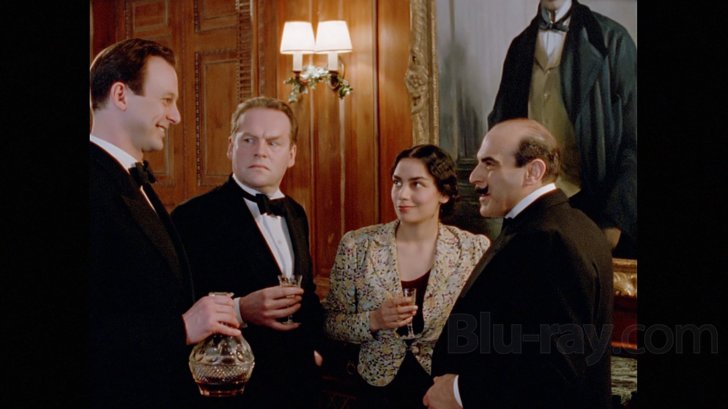
In general, the image on these two 1080p, AVC-encoded discs (derived, as with the previous series, from 16mm sources) is consistent with the best of Acorn Media's previous Poirot sets, with exceptional clarity and detail, colors that are saturated and often vibrant, blacks that are truly rendered, and contrast that remains at the appropriate level to distinguish elements in the frame without blooming or blowing out detail. Film grain is readily evident, but almost never obvious, and there are no indications of grain reduction, detail filtering or artificial sharpening. The image remains natural and film-like, and of course there are no compression artifacts. However, there are two notable departures from previous Acorn Media sets of Poirot. The entire episode of Hercule Poirot's Christmas appears to have been shot in a different visual style than any previous entry in the series. White levels are noticeably higher, almost as if the film had been deliberately overexposed. While this would be an understandable approach for the episode's opening sequence set in the South African desert, it seems an unusual choice for the remainder of the episode, which is set during the Christmas season. (Then again, it's wintry and there's snow all around.) The second departure is more serious. For approximately twenty-four minutes (or about one "act") of Murder on the Links, the image is noticeably different from the rest of the episode: soft, indistinct, slightly muddy and with weaker colors. Without knowing the reason, I can only guess, but it looks like source material of lesser quality had to be used for this section, which runs from timemark 47:51 to 1:11:54 and extends precisely from one commercial break fade-out to the next.
Poirot: Series 6 Blu-ray Movie, Audio Quality 
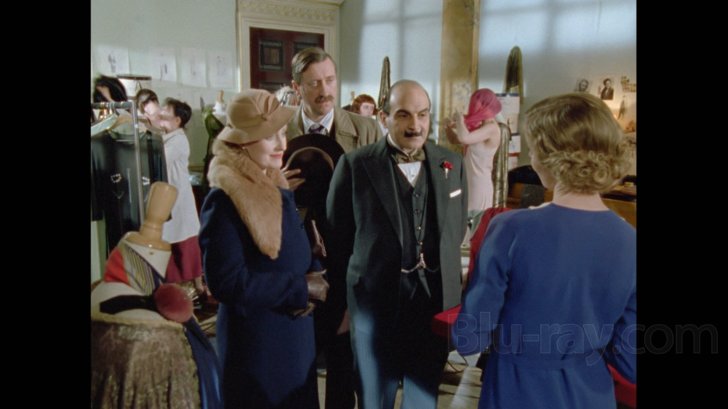
As with Series 5, Acorn has continued to use Dolby Digital 2.0 at 256 kbps on Series 6. (The back of the disc case and slipcover continue to state erroneously that the audio is PCM.) As I have previously noted, the dialogue is certainly clear enough with DD 2.0, and Christopher Gunning's musical score still sounds excellent, but I would prefer a lossless track.
Poirot: Series 6 Blu-ray Movie, Special Features and Extras 
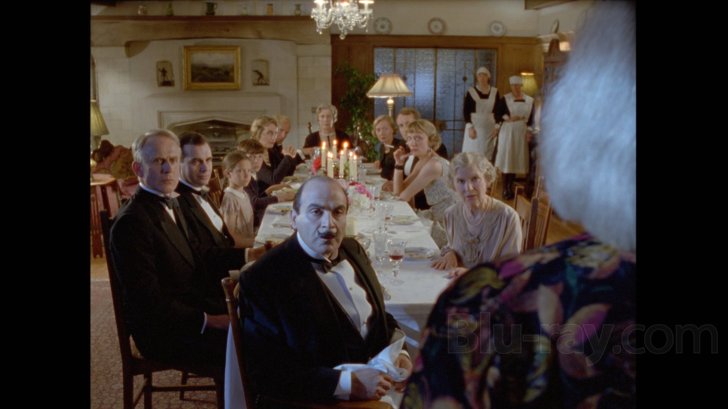
Other than introductory trailers on disc 1 for Acorn Media, Agatha Christie's Marple and Case Histories, no extras are included.
Poirot: Series 6 Blu-ray Movie, Overall Score and Recommendation 
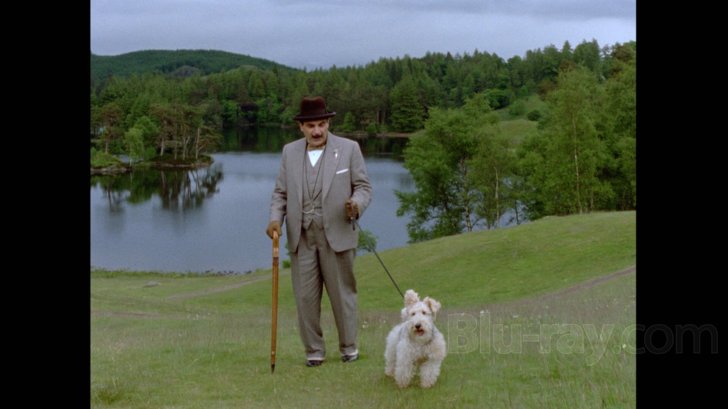
Despite minor video issues, these four tales are excellent additions to the Poirot canon. Each one reveals some new marvel of storytelling wit, visual invention or acting legerdemain that will entertain fans of the series, even if Christie purists may sometimes cry foul at some of the liberties taken with the original texts. Taken together, these first six series are the "classic" Poirot. In the new century, many things will change. Highly recommended (with a caveat).
Other editions
Poirot: Other Seasons

Poirot: Series 1
1989

Poirot: Series 2
1990

Poirot: Series 3
1991

Poirot: Series 4
1992

Poirot: Series 5
1993

Poirot: Series 7 & 8
2000-2001

Poirot: Series 9
2003-2004

Agatha Christie's Death on the Nile
2004

Poirot: Series 10
2006

Poirot: Series 11
2008-2009

Poirot: The Movie Collection - Set 6
2009-2010

Poirot: Murder on the Orient Express
2010

Poirot: Series 12
2010-2011

Poirot: Series 13
2013
Similar titles
Similar titles you might also like
(Still not reliable for this title)

The Mirror Crack'd
1980

State of Play
2009

Murdoch Mysteries: Season 18
The Artful Detective
2024-2025

Zodiac 4K
Theatrical 4K | Director's Cut BD only
2007

Foyle's War: Set 8
2014

The Night of the Generals
Limited Edition to 3000 - SOLD OUT
1967

Murder on the Orient Express 4K
50th Anniversary Edition
1974

Miss Marple: Volume 1
The Murder at the Vicarage / The Body in the Library / The Moving Finger / A Murder is Announced
1984-1986

The Raven
2012

Murder on the Orient Express
2017

Twisted
2004

The Black Dahlia
2006

Evil Under the Sun
1982

Gosford Park
Arrow Academy
2001

Crooked House
2017

The Girl with the Dragon Tattoo
2011

The Bone Collector 4K
1999

Murder by Decree 4K
1979

Taboo: Season One
2017

L.A. Confidential
1997